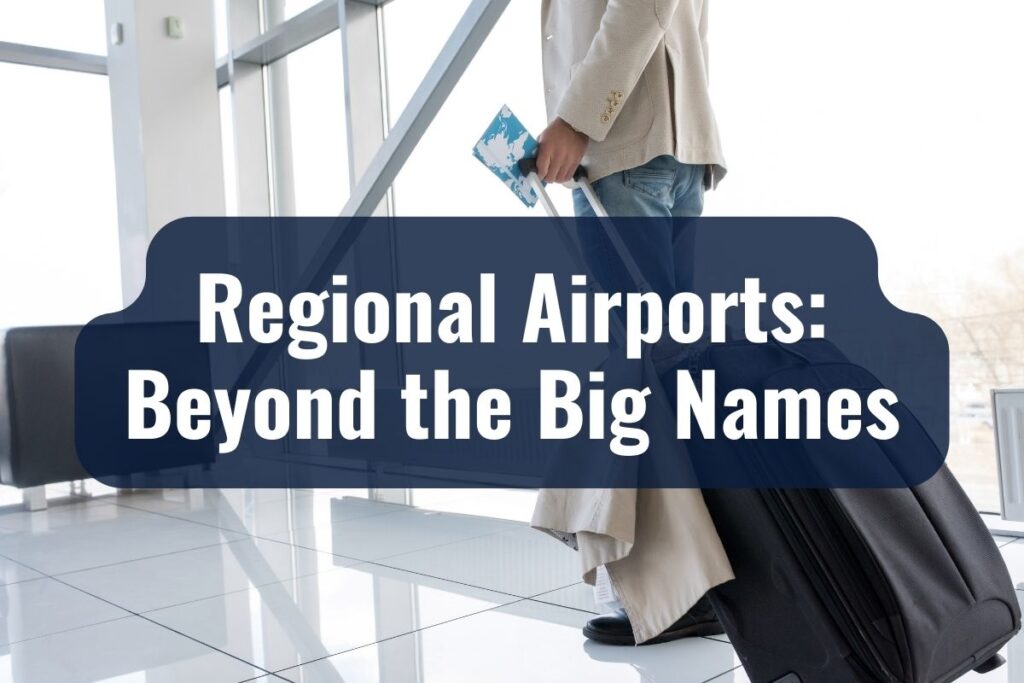Germany, with its rich history, vibrant culture, and pivotal role in the global landscape, serves as a nexus for international travelers. Germany’s airports are not just hubs of transportation but are emblematic of Germany’s commitment to efficiency, innovation, and connectivity.
KEY TAKEAWAYS
- German airports serve as cultural crossroads, merging efficiency with a rich heritage.
- Major international airports like Frankfurt, Munich, and Berlin connect Germany globally.
- Regional airports offer an intimate glimpse into Germany’s diverse landscapes and communities.
- For non-German speakers, airports are navigable through multilingual signs and digital tools.
- Travelers can expect a range of amenities, from gastronomic delights to wellness services.
Major International Airports in Germany
Frankfurt Airport (FRA)
Located in Frankfurt am Main, this airport stands as the busiest in Germany. A marvel of modern engineering and architectural prowess, Frankfurt Airport serves as a gateway to Europe and beyond. Its vast terminals and expansive runways are a testament to Germany’s commitment to fostering global connections.
Munich Airport (MUC)
Nestled in the heart of Bavaria, Munich Airport is more than a transit point; it’s a representation of Bavarian hospitality and efficiency. As Germany’s second busiest airport, Munich seamlessly integrates luxury, comfort, and technology, offering travelers a truly world-class experience.
Düsseldorf Airport (DUS)
Situated in North Rhine-Westphalia, Düsseldorf Airport is a beacon of innovation. As a vital hub for both business and leisure travelers, it reflects the dynamic and cosmopolitan spirit of the region.
Berlin Brandenburg Airport (BER)
As the primary airport of the capital city, Berlin Brandenburg is imbued with a sense of history and promise. It serves as a testament to Berlin’s resurgence as a global city, post its tumultuous past, and its aspirations for the future.
Hamburg Airport (HAM)
Located in the nation’s second-largest city, Hamburg Airport embodies the maritime spirit of the Hanseatic city. As a crucial node in northern Germany, it efficiently bridges the gap between land and sea, offering travelers a unique blend of Hanseatic tradition and modernity.
Regional Airports: Beyond the Big Names

These regional airports, often overshadowed by their larger counterparts, play an indispensable role in knitting the nation together, while also connecting Germany’s diverse regions to the broader expanse of Europe and beyond.
Stuttgart Airport (STR)
Encompassed by the rolling hills of Baden-Württemberg, Stuttgart Airport stands as a nexus between Germany’s industrial might and its lush, pastoral beauty. Serving as the main artery for the region, it seamlessly integrates Swabian traditions with the demands of modern-day travel.
Cologne Bonn Airport (CGN)
At the confluence of the Rhine and Sieg rivers, this airport is a testament to the enduring spirit of the Rhineland. Cologne Bonn not only facilitates travel but also echoes the melodies of the age-old cathedrals and the dynamism of contemporary media hubs present in the region.
Bremen Airport (BRE)
Heralding from the Hanseatic League’s historic city, Bremen Airport encapsulates the maritime legacy of the north. As the wind whispers tales of merchant vessels of yore, this airport serves as a vital link between the region’s past glories and its future aspirations.
Dresden Airport (DRS)
Amidst the architectural splendors of Saxony, Dresden Airport rises, blending the old-world charm of the region with state-of-the-art facilities. As a gateway to Eastern Germany, it serves as a poignant reminder of the region’s resilience and rebirth.
Nuremberg Airport (NUE)
Located in the Franconian heartland, Nuremberg Airport is more than a transportation hub; it’s a repository of history. Serving as a bridge between medieval fortresses and modern commerce, it captures the essence of Franconia in every takeoff and landing.
In the spirit of enlightenment and connectivity, we offer a compass to help you navigate these architectural marvels with ease and confidence.
Signage is Your Friend
German airports pride themselves on their clear, intuitive signage. International symbols, paired with multilingual instructions (often in English, French, and sometimes Spanish), guide travelers at every turn. A keen eye and a little awareness can help you find your way with ease.
Utilize Information Desks
Strategically positioned across terminals, information desks are staffed with multilingual professionals trained to assist travelers. They are your beacon in a bustling terminal, always ready to guide and inform.
Download Airport Apps
Many German airports offer dedicated mobile applications that come equipped with maps, flight information, and other essential services. These apps often feature multiple language options, ensuring that non-German speakers can navigate the digital landscape with ease.
Listen Carefully to Announcements
While the primary language of announcements is German, crucial information, especially in major and regional airports, is often repeated in English. Attuning your ear to these announcements can keep you well-informed and prepared.
Learn Basic Phrases
While it’s not essential, learning a handful of basic German phrases can enhance your airport experience. Simple greetings, queries about directions, or gratitude can not only make navigation easier but also enrich your interaction with locals.
Stay Calm and Patient
Even if you feel a bit lost or overwhelmed, remember that German airports are designed with the traveler in mind. Staff members are generally understanding and patient, always ready to assist those in need.
Connect with Fellow Travelers
The universal language of travel binds adventurers. Fellow travelers, both local and international, can often provide insights, tips, and shared experiences that can be invaluable in unfamiliar settings.
Amenities and Services: What to Expect

Lounge Excellence
The airport lounges in Germany exude an ambiance of tranquility and luxury. They cater to varying passenger needs, from business professionals seeking a quiet corner for work to weary travelers yearning for a restful reprieve. Many lounges also offer gourmet cuisine, refreshing showers, and even spa services.
Free Wi-Fi Access
In today’s digital age, connectivity is paramount. German airports understand this and provide passengers with complimentary Wi-Fi services. This ensures that whether you wish to send that last-minute email or video call your loved ones, the digital world remains at your fingertips.
Children’s Play Areas
Recognizing the restless spirit of younger travelers, German airports are equipped with dedicated play areas. These zones, brimming with colorful toys, games, and interactive installations, ensure that the little ones are entertained and engaged.
Diverse Culinary Offerings
The gastronomic delights at German airports are nothing short of a culinary journey. From traditional German bakeries serving fresh “Brötchen” to elegant bistros offering international cuisines, there’s a plate for every palate.
Shopping Extravaganza
The shopping arcades within German airports are a shopper’s paradise. They house an array of boutiques and retail stores, ranging from high-end fashion brands to quaint local souvenirs, ensuring that travelers can indulge in some retail therapy before their flights.
Health and Well-being Services
Several airports offer wellness centers, pharmacies, and even medical clinics. Whether you’re seeking a quick massage, essential medication, or medical assistance, rest assured that your well-being is a priority.
Efficient Transport Links
Germany’s commitment to seamless connectivity extends beyond its runways. Major airports are well-linked to public transportation systems, including regional trains, trams, and buses. This ensures that passengers can transition smoothly from air travel to road or rail.
Dedicated Assistance Services
For travelers with reduced mobility or other specific needs, German airports offer dedicated assistance. Special lounges, mobility aids, and well-trained staff ensure that every traveler’s journey is comfortable and dignified.
Public Transportation Connections
German airports, in their vision of holistic connectivity, ensure that passengers are not only linked to global destinations but also seamlessly connected to the very veins of the nation through an intricate web of public transportation.
Rail Connections
S-Bahn and U-Bahn: Many of Germany’s major airports, including Frankfurt, Munich, and Berlin, are directly connected to the city centers through S-Bahn (suburban trains) or U-Bahn (underground trains). These frequent and efficient services offer travelers a quick transit to the heart of the cities.
ICE and Regional Trains: Airports like Frankfurt boast connections to Germany’s high-speed InterCityExpress (ICE) train network, providing swift travel options to other cities and regions.
Bus and Coach Services
Beyond the railways, buses provide an essential link between the airport and various city points. Regularly scheduled airport express buses and regional coaches ensure passengers can reach even those destinations not directly served by rail.
Trams
In cities where trams are a significant mode of transportation, such as Düsseldorf or Nuremberg, airports are woven into the tram network, enabling passengers to hop on these tracks of history and modernity alike.
Car Rentals and Taxis
For those seeking the freedom of personal transit or requiring a more direct route, airports house multiple car rental agencies and have taxi ranks, ensuring that personal mobility is a step away.
Integrated Ticketing
The beauty of German public transportation lies not just in its efficiency but in its integration. Many airports offer ticketing counters or machines where travelers can purchase tickets valid for multiple modes of transit – be it train, tram, or bus. This unified system simplifies the journey, turning potential complexities into a breezy ride.
Digital Connect
Several mobile applications and digital platforms, often in multiple languages, provide real-time updates, schedules, and route planners for public transportation connected to airports. These digital assistants ensure that even a non-German speaker can confidently navigate the transit network.
Related: Mobile Networks in Germany: The Top 3 in 2023
Eco-Conscious Transit
In line with Germany’s commitment to sustainability, many public transportation options emanating from the airports prioritize eco-friendly operations, from electric buses to energy-efficient trains. Thus, every journey becomes a step towards a greener tomorrow.
Safety and Security: Keeping Your Trip Smooth

As travelers, while we may be engrossed in our itineraries, tales, and explorations, the guardians of these transit temples ensure that our journey remains uninterrupted and serene.
Advanced Screening Protocols
German airports employ state-of-the-art security screening methods. These include advanced body scanners, x-ray machines, and specialized equipment to detect any illicit items. While these protocols are thorough, they’re designed to minimize inconvenience and ensure swift passage for travelers.
Dedicated Security Personnel
Highly trained and ever vigilant, the security personnel at German airports are skilled in ensuring safety and assisting travelers. Their overt and covert presence is a testament to their commitment to keeping every journey secure.
Clear Signage for Procedures
To ease the security process, airports feature clear, multilingual signage guiding travelers through each step – from where to place electronics to how to ready oneself for screening. This clarity streamlines the process, ensuring that even first-time visitors navigate security with ease.
Safety in Health
Airports have amplified their health and hygiene measures in response to global health concerns. Expect to see hand sanitizing stations, frequent cleaning of high-touch areas, and protocols to maintain social distancing, ensuring that safety extends beyond just security concerns.
Lost and Found Services
Should travelers misplace personal items, dedicated Lost and Found counters in every airport assist in reuniting them with their belongings. These services underscore the comprehensive approach to passenger well-being.
Emergency Protocols
German airports are equipped with advanced emergency response systems, including medical facilities, fire safety measures, and evacuation procedures. Regular drills and training sessions ensure that swift and organized action is taken in the rare event of an emergency.
Awareness and Vigilance
While airports take extensive measures, travelers are encouraged to remain aware and report suspicious activities. Together, the collective vigilance of both the airport staff and passengers ensures a fortified environment.
Informational Campaigns
Periodically, airports run informational campaigns educating travelers about safe travel practices, forbidden items, and how to streamline their passage through security checkpoints.
Making the Most of Your German Airport Experience
Embrace the Efficiency
One of Germany’s hallmarks is its unwavering commitment to efficiency. As you navigate through the airports, let yourself sync with this rhythm of punctuality and order. Aligning with this tempo can transform your transit experience from mere movement to a dance of precision.
Savor the Moments
Let yourself pause and savor these moments, whether it’s the rich aroma wafting from a traditional German bakery or the soft notes of a live piano performance echoing in a terminal. They are the heartbeats of a culture, the soul of a place.
Stay Curious
Whether a sprawling international hub or a cozy regional outpost, each airport tells its own tale. Explore the art installations, engage with the informational plaques, or strike up a conversation with a fellow traveler. Every interaction, every observation, is a chapter waiting to be read.
Travel Prepared
A touch of preparation goes a long way to make the most of your German airport experience. Familiarize yourself with the airport layout, the amenities on offer, and the transportation links beforehand. This foresight ensures a smoother, more enjoyable transit.
Seek Assistance When Needed
Never hesitate to approach the airport staff or information counters if you find yourself in doubt or need assistance. Their primary goal is to assist and ensure your journey is smooth and memorable.
Relish the Confluence of Cultures
With their international and domestic wings, German airports are a melting pot of cultures. As you traverse these spaces, let yourself revel in this confluence, this meeting of worlds. It’s a journey across destinations, cultures, ideas, and dreams.
Related: New to Germany: A Newcomer’s Guide to Living in Germany
Additional Resources
- Deutsche Bahn: The official website and app of Germany’s national railway company provides comprehensive train schedules, ticketing options, and connectivity details from and to airports.
- Local Public Transport Services: Each city or region has its transportation network with dedicated platforms offering timetables, route maps, and fare details.
- FlightRadar24: For live flight tracking and airport activity details.
- DB Navigator: The official app of Deutsche Bahn for train schedules and ticket bookings.
- World Health Organization (WHO): Stay updated with health advisories, especially pertinent for travelers.
- German Federal Foreign Office: For travel advisories and safety guidelines specific to Germany.


